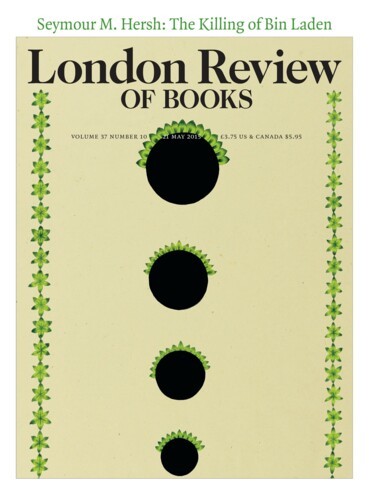Back in Sweden again. (I travel back and forth.) What strikes me this time is the great contrast between the political and economic mood here and in the UK. Britain is gripped by ‘austerity’, and full of gloom and doom (except for the very rich). More cuts in social provision are promised, hitting the poorest and most disadvantaged, and the NHS is collapsing for want of funds. The government is using the ‘crisis’ to extend privatisation and diminish the state, on what appear to be purely ideological grounds.
Bernard Porter
Bernard Porter’s recent books include Imperial Britain: What the Empire Wasn’t and Empire Ways. He lives in Stockholm.
The Labour Party has always been split over foreign policy. The Boer War, fought between capitalists and racists, made it difficult to choose a side; likewise the First World War (imperialism v. Prussianism); less so the Second World War, which divided the Conservatives more. The Falklands War was fought against a fascist dictator, but by the hated Thatcher and in defence of a colonial relic. And then there's the Iraq War and the bombing of Syria.
There are many ways of defeating a nation. One is by destroying its ‘values’. If they are liberal, it can be difficult to defend and preserve them in time of war. Modern terrorism, we are told, is a kind of war. The French republic is struggling to maintain its founding principles of liberty, equality and fraternity in the face of it. Other nations have been through the same experience, and quandary, in recent years. The United States was only half successful at keeping its ideals intact after 9/11. Norway was much admired for its determination to do better after the Utøya massacre of 2011.
A lot of journalists (and others) have been calling Jeremy Corbyn a dinosaur. They should beware of the label. At the turn of the 20th century, the dominant political discourse – at least in what today would be called the ‘Westminster bubble’ – was that liberalism was passé, that the future lay with great empires and imperialist societies, and that anti-imperialists were doomed to ossify. ‘Imperialism’ infected all political parties, including the ‘Lib-Imp’ wing of the Liberal party, and even some Labour MPs. Yet within five years of E.T. Reed’s depiction in Punch in 1900 of the remaining Liberal anti-imperialists of his time (shown here), imperialism had lost its attraction to voters, the ‘imperialist’ party was hammered in an election, and a new, quite old-fashioned looking Liberal government came to power.
Who was the enemy? Gallipoli
Bernard Porter, 21 May 2015
From the time of the Crusades onwards, Western military interventions in the Near and Middle East have nearly all been disastrous; in the long run – just look at Iraq today – but usually in the short term too. The Gallipoli adventure of 1915, a disaster in every way, was dreamed up after Turkey sided with Germany in the Great War. Churchill’s cunning plan was to cut...
Pieces about Bernard Porter in the LRB
Lumpers v. Splitters: How to Build an Empire
Ferdinand Mount, 31 March 2016
‘Those who make many species are the “splitters” and those who make few are the “lumpers”,’ Charles Darwin wrote in 1857 to his friend, the great botanist...
Read anywhere with the London Review of Books app, available now from the App Store for Apple devices, Google Play for Android devices and Amazon for your Kindle Fire.
Sign up to our newsletter
For highlights from the latest issue, our archive and the blog, as well as news, events and exclusive promotions.


